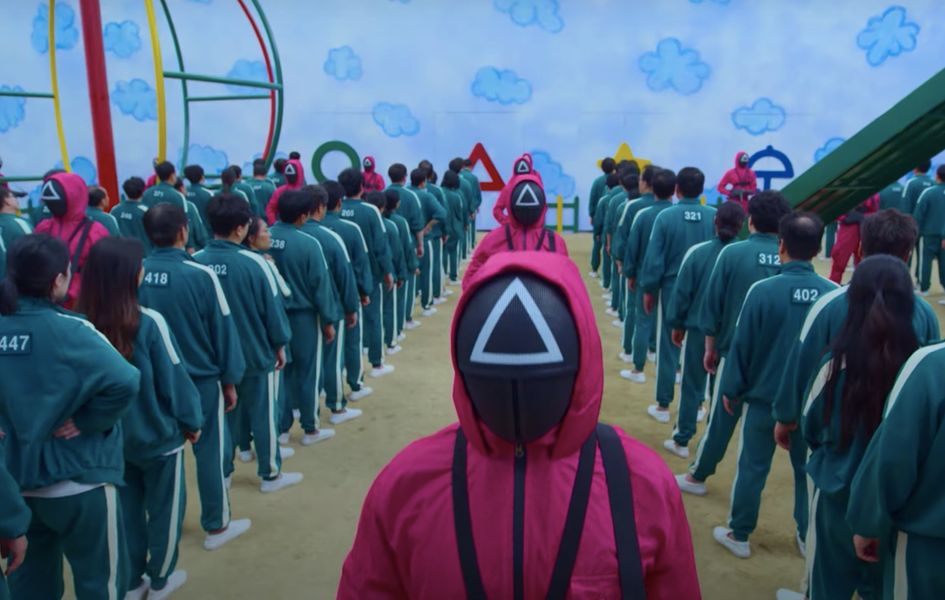South Korean filmmaker Hwang Dong-hyuk never expected Squid Game to get picked up, let alone the nine-episode series amassing Netflix a revenue of $900 million as per the streamer’s internal data.
While directing acclaimed films like Silenced, Miss Granny and The Fortress, Hwang Dong-hyuk struggled with his project Squid Game which did not get picked up for nearly a decade. Talking about the “unfamiliar and violent” premise of the show that he was working on since 2009, he said, “There were people who thought it was a little too complex and not commercial. I wasn’t able to get enough investment, and casting was difficult. I dabbled in it for about a year, but I had to put it to sleep then.”
Released in 2021, Squid Game is Netflix’s most profitable acquisition to date. Not only did it amass massive revenue for the streamer but also introduced the world to its current Korean pop-cultural high, becoming a global phenomenon in itself.
Starring Lee Jung-Jae, Park Hae-Soo, Jung Ho-Yeon, O Yeong-Su, Anupam Tripathi, Wi Ha-Joon and many more, the series is gruesome and violent, set in a dystopian premise. The series revolves around a set of twisted childhood games that constitute the deadly Squid Games. A group of 456 odd participants are confined in tight spaces manoeuvered by odd shapes while being under the constant surveillance of armed, masked men. For prize money of 45.6 billion Korean Won, they participate in various games that cost them their lives.
Talking about the show, Hwang said, “I wanted to write a story that was an allegory or fable about modern capitalist society, something that depicts an extreme competition, somewhat like the extreme competition of life. But I wanted it to use the kind of characters we’ve all met in real life.”
Hwang was pretty successful in creating a show that served as a scathing commentary on the capitalistic society, power politics, class conflict, exploitation of the poor, economic crises and the general degradation of the human psyche. With a dystopian premise set in modern-day Korea, Hwang was successfully able to drive in his idea of how the rich love eating the poor inside out, both physically and emotionally to serve their pleasure and purpose. Hwang’s take on body politics involved the poor being desperate for money and lending their bodies on the line to survive in a ruthless world.
However, with the announcement of the upcoming Netflix reality show which promises a tamer, deathless version of Squid Game (titled Squid Game: The Challenge), the streamer seems to have missed the whole point of the show by a good mile.
After Squid Game, viewers worldwide were forced to reflect on various ideas and unlearn prejudices. The shock factor lay in both the blood and gore as well as the underlying commentary and sentiment. When YouTuber MrBeast arranged a real-life Squid Game, promising a whopping $10,000 to the winner, $4,000 to the eliminated participants and $2000 for just showing up, he was heavily criticised for having misread the show. Chrissy Teigen, too, faced immense backlash for ironically holding a Squid game party for her rich friends who dressed up as poor participants for an evening of fun and debauchery.
Their actions contradicted the whole point of the show; Squid Game was not made to entertain people. Rather, it was introduced to the world to induce fear and make people question the current depravity of humanity.
However, Netflix’s actions seem even more unforgivable and unbelievable. Currently, Netflix is having a pretty hard time due to a massive subscriber exodus and falling stock prices. The streamer is relying heavily on shows like Stranger Things and Squid Game and other similar titles with a gigantic fanbase, to retain their position at the top of the streaming wars. While they are cancelling productions and stealthily laying off employees (especially people of colour) just months after recruitment, the streamer seems to have enough money to announce the auditions for such an obnoxious idea.
Squid Game: The Challenge promises $4.56 million to the winner and is casting auditions to find a group of 456 willing participants whose worst fate will cause them to return home “empty-handed.” By forcing people to partake in humiliating games while they oversee the entire procedure, they are assuming the roles of the notorious and revolting VIPs in the show who got off on the idea of having poor people fight to the death.
Yet another whitewashing of an inherently Korean sensibility, Netflix’s idea of recreating a searing narrative of the class divide for the sake of entertainment seems absolutely abhorrent. If one questions Hwang’s role in it, we cannot deny the streamer’s financial hold on him. Bound by a contract, the filmmaker probably affirms any decision, even compromising the integrity of the show.
The last thing we are looking for are confessional snippets in between the games on the reality show to seek empathy from the audience – it’s time Netflix realises how tiring their formulaic garbage is.
